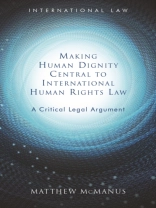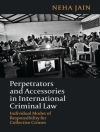In recent years, there has been an explosion of writing on the topic of human dignity across a plethora of different academic disciplines. Despite this explosion of interest, there is one group – critical legal scholars – that has devoted little if any attention to human dignity. This book argues that these scholars should attend to human dignity, a concept rich enough to support a whole range of progressive ambitions, particularly in the field of international law. It synthesizes certain liberal arguments about the good of self-authorship with the critical legal philosophy of Roberto Unger and the capabilities approach to agency of Amartya Sen, to formulate a unique conception of human dignity. The author argues how human dignity flows from an individual’s capacity for self-authorship as defined by the set of expressive capabilities s/he possesses, and the book demonstrates how this conception can enrich our understanding of international human rights law by making the amplification of human dignity its fundamental orientation.
Table of Content
Acknowledgements
1. Overview of the Project
PART I: Theorizing the relationship between human dignity and international human rights law
2. Dignity’s Contentious History
3. A Critical Legal Conception of Human Dignity
4. The State, International Human Rights Law and the Amplification of Human Dignity in Practice
PART II: Realizing human dignity in the practice of international human rights law
5. Realizing Human Dignity Through Amplifying Democratic Rights
6. Realizing Human Dignity Through Establishing Rights to an Equality of Expressive Capabilities
7. Concluding Remarks on What it Means to Overcome False Necessity
Notes
Bibliography
Index
About the author
This book is primarily written for academic and graduate studies.












